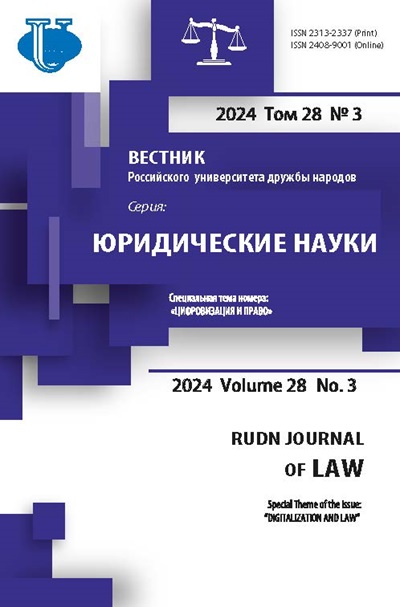Digital identity and digital image of an individual: Legal characteristics and the place in the system of related categories
- Authors: Demkin V.O.1
-
Affiliations:
- National Research University Higher School of Economics (HSE University)
- Issue: Vol 28, No 3 (2024): DIGITALIZATION AND LAW
- Pages: 512-527
- Section: STATE AND LAW IN CONTEMPORARY WORLD
- URL: https://journals.rudn.ru/law/article/view/40933
- DOI: https://doi.org/10.22363/2313-2337-2024-28-3-512-527
- EDN: https://elibrary.ru/FTBYVW
- ID: 40933
Cite item
Abstract
The purpose of the work is to study the definition and content of the terms “digital personality”, “digital image of a person”, “digital profile”, “digital citizenship”, their interrelation, as well as legal problems related to these categories. The relevance of the topic is confirmed by the active discussion of regulatory legal acts in the areas of building a system of digital profiles, digital citizenship in different countries of the world. The method of research is the analysis of Russian and foreign literature and practice, identification of their fundamental provisions, study of interrelations with more “classical” legal categories, including classical human rights and personal data. The conclusion is drawn about the fundamental position of the category of “digital personality” for the study of the phenomenon of the modern digital person. It is primarily related to human rights in the modern digital world. Such a category directly affects other concepts under study, including information (data) about individuals, as well as the overall policy in the sphere of citizens' participation in state governance. In order to study the phenomenon of the digital person, it is necessary, first of all, to study the category of the digital person from the point of view of their rights in the digital world, i.e., from the point of view of human rights.
About the authors
Vladislav O. Demkin
National Research University Higher School of Economics (HSE University)
Author for correspondence.
Email: vodemkin@hse.ru
ORCID iD: 0000-0002-1079-425X
SPIN-code: 1755-2053
graduate student of the Doctoral School of Law
3 Bolshoy Trekhsvyatitelsky Pereulok, Moscow, 109028, Russian FederationReferences
- Kapitonova, E.A. (2019) On understanding of the term “person” in modern legal science. Law and Right. (9), 50-53. https://doi.org/10.24411/2073-3313-2019-10395 (in Russian).
- Khusnutdinov, A.I. (2017) The right to access the Internet - a new human right? Comparative Constitutional Review. 4(119), 109-123. https://doi.org/10.21128/1812-7126-2017-4-109-123 (in Russian).
- Kravets, I.A. (2023) Digital citizenship and constitutional challenges in the information and algorithmic society. Comparative Constitutional Review. (2), 93-123. https://doi.org/ 10.21128/1812-7126-2023-2-93-123 (in Russian).
- Maleina, M.N. (2017) Formation of the concept of “human being” in Russian law. State and Law. (1), 16-23. (in Russian).
- Mossberger, K., Tolbert, C.J. & McNeal, R.S. (2008) Digital Citizenship: The Internet, Society, and Participation. Cambridge, MA: The MIT Press.
- Myers, D.G. (2017) Exploring Social Psychology. 8th edition. New York, McGraw Hill.
- Ohm, P. (2010) Broken promises of privacy: responding to the surprising failure of anonymization. UCLA Law Review. (57), 1701-1777.
- Sartor, G. (2017) Human Rights and Information Technologies. The Oxford Handbook of Law, Regulation and Technology. 424-450. https://doi.org/10.1093/oxfordhb/-9780199680832.013.79
- Saveliev, A.I. (2015) The issues of implementing legislation on personal data in the era of Big Data. Law. Journal of the Higher School of Economics. (1), 43-66. (in Russian).
- Solove, D.J. (2004) The Digital person. Technology and privacy in the information age. New York, New York University Press.
- Sullivan, C. (2009) Digital identity - The legal person? Computer Law & Security Review. (25), 227-236. https://doi.org/10.1016/j.clsr.2009.03.009
- Talapina, E.V. (2021) Comparative digital law: formation and prospects. Journal of Russian Law. 25(9), 18-32. https://doi.org/10.12737/jrl.2021.108 (in Russian).
- Talapina, E.V., Antopolsky, A.A. & Monakhov, V.N. (2021) Human Rights in the Era of the Internet: public-law aspect: monograph. Talapina, E.V. (ed.). Moscow, Prospect Publ. (in Russian).
- Truby, J. & Brown, R. (2021) Human digital thought clones: the Holy Grail of artificial intelligence for big data. Information & Communications Technology Law. 30 (2), 140-186. https://doi.org/10.1080/13600834.2020.1850174
- Varlamova, N.V. (2019) Digital rights - a new generation of human rights? Proceedings of the Institute of State and Law of the Russian Academy of Sciences. 14(4), 9-46. https://doi.org/10.35427/2073-4522-2019-14-4-varlamova (in Russian).
- Vinogradova, E.B., Polyakova, T.A. & Minbaleev, A.V. (2021) Digital profile: concept, mechanisms of regulation and problems of implementation. Law Enforcement. 5(4), 5-19. https://doi.org/10.52468/2542-1514.2021.5(4).5-19 (in Russian).
- Volkonsky, Y.K. (2007) Modern political and legal relations of the individual and the state in the Russian Federation: Candidate of Legal Sciences dissertation. Vladimir, Vladimir State Pedagogical University. (in Russian).
- Zajmi, I. (2015) Online Identity. In: Global Information and national cultures. Pristina, Kosovo. pp. 331-341.
Supplementary files















